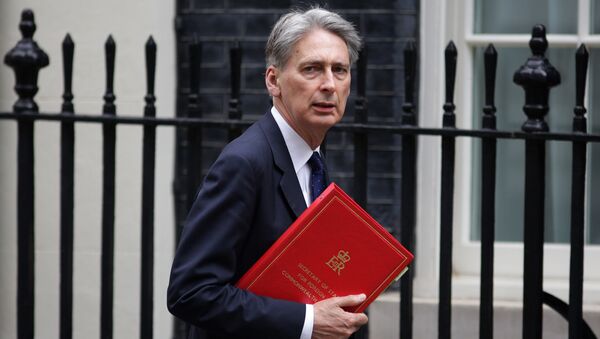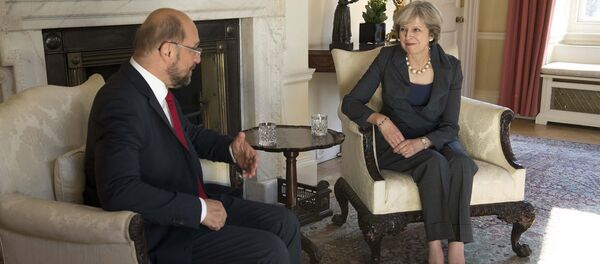Kristian Rouz – Gains in the UK’s government bond (gilt) yields, and the emerging controversy surrounding Chancellor of the Exchequer Philip Hammond's alleged decision to resign, have weighed on the pound sterling FX rate as concern over the ‘hard’ Brexit scenario is brewing.
The British pound slipped to 1.2180 USD on Monday, having dropped roughly 6pc after Prime Minister Theresa May announced earlier this month the UK would part with the European Union (EU) no later than in April 2017. The prospect of fast-track separation has triggered doubt and concern, both among market participants and government officials. On Monday, the 10-year gilt yield rose to 1.12pc, almost reaching its highest point since the June 23 Brexit referendum. Meanwhile, Chancellor of the Treasury Philip Hammond was reported by Daily Telegraph as potentially leaving the office for having blasted PM May’s hardline approach to Brexit.
Subsequently, foreign investment in the UK is expected to fall amid the country's significant current account deficit, threatening to inflict damage on the economy unless compensated for by a surge in exports.
"Investors are beginning to demand a higher premium for holding UK government debt because of two factors — the political uncertainty and risks about the economic impact of Brexit, and [the fact that] inflation expectations are rising on the back of a rapidly declining pound," Kathleen Brooks of the London-based brokerage City Index said.
Rising inflation and currency devaluation are generally poised to benefit the UK’s economy, allowing it to overcome the low-inflation stalemate that is choking the economies of Japan and the US. However, the resulting higher prices of imported goods might undermine consumer confidence. Domestic consumption is driving some 79pc of the UK’s GDP, and the Bank of England (BOE) will likely use all its firepower to support consumption, including cutting rates further and implementing other pro-growth measures, such as ‘helicopter money’.
Meanwhile, the cabinet denied the rumours of Hammond’s resignation.
“He is arguing from a very Treasury point of view. He is arguing like an accountant seeing the risk of everything rather than the opportunity,” an unnamed governmental source told the Telegraph.
The Treasury itself dismissed the allegations as “complete and utter nonsense.”
“(Hammond) is very clear that the vote to leave the EU was not a vote to sink the economy," the Telegraph’s Treasury sources added.
Meanwhile, BoE Governor Mark Carney said on Friday that inflation would slightly overshoot the 2pc target in 2017 under the regulator’s control. The acceleration in inflation, the BoE believe, would spur employment and broader economic growth.
The speculation of possibly mounting capital outflows from the UK is largely pre-emptive as the City of London remains one of the world’s largest financial hubs, and British assets are an attractive investment destination.
"Some seem to interpret these (gains in gilt yields) as an early indication of capital outflows from the UK, which could escalate into a full-blown balance of payments crisis," the French lender Credit Agricole said in a note. "This interpretation is further corroborated by anecdotal evidence from our recent meetings with clients in Asia. These confirmed that capital outflows from the UK and/or reserve diversification out of sterling are not an imminent threat."
The selloff in gilts also supports the view that demand for safe havens in the UK is declining amid the higher inflation expectations. In such a situation, investors are seeking to buy real economy assets while they remain cheap, and then wait until a pick-up in economic growth renders those assets dearer.
The UK has become an increasingly dynamic market in the wake of Brexit, and is continuing to draw significant investor interest, unlike many other advances economies, where only haven assets are faring fairly well. All that said, there is still enough optimism regarding Brexit amidst all the tumultuous allegations.




